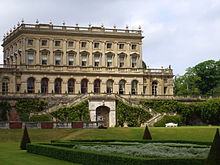Cliveden set

The Cliveden set were an upper-class group of politically influential people active in the 1930s in the United Kingdom, prior to the Second World War. They were in the circle of Nancy Astor, Viscountess Astor, the first female Member of Parliament to take up her seat. The name comes from Cliveden, a stately home in Buckinghamshire that was Astor's country residence.
The "Cliveden Set" tag was coined by Claud Cockburn in his journalism for the communist newspaper The Week. His notion of an upper class pro-German conspiracy was widely accepted by opponents of Appeasement in the late 1930s. It was long accepted that the aristocratic Germanophile social network supported friendly relations with Nazi Germany and helped create the 1930s policy of appeasement. John L. Spivak, writing in 1939, devoted a chapter to the Cliveden Set.[1]
After the end of World War II in Europe, the discovery of the Nazis' Black Book in September 1945 showed that all the group's members were to be arrested as soon as Britain had been invaded by the Axis. Lady Astor remarked, "It is the complete answer to the terrible lie that the so-called 'Cliveden Set' was pro-Fascist."[2]
New research shows that the Astors invited a very wide range of guests, including socialists, communists and enemies of appeasement. Scholars no longer claim there was any Cliveden conspiracy. Historian Andrew Roberts says: "The myth of Cliveden being a nest of appeasers, let alone pro-Nazis, is exploded."[3] Norman Rose's 2000 account of the group rejects the conspiracy theory of a pro-Nazi cabal. Carroll Quigley argues against the "mistaken idea" that the Cliveden group was pro-German: "They were neither anti-German in 1910 nor Pro-German in 1938, but pro-Empire all the time."[4]
Christopher Sykes, in a sympathetic 1972 biography of Nancy Astor, argued that the entire story about the Cliveden Set had been an ideologically motivated fabrication by Cockburn that came to be generally accepted by the public, which was looking for scapegoats for the British prewar appeasement of Adolf Hitler. Some academic arguments have stated that Cockburn's account may have not have been entirely accurate, but that his main allegations cannot be easily dismissed.[5][6]
Alleged conspirators
[edit]- Nancy Astor, Viscountess Astor, politician and socialite
- Geoffrey Dawson, editor of the London Times newspaper
- Philip Kerr (Lord Lothian), author and politician
- Edward Wood (Lord Halifax), politician
- William Montagu, 9th Duke of Manchester, politician
- Robert Brand
Fictional portrayals
[edit]Hogan's Heroes
[edit]In the fourth and fifth episodes of season six of the 1960s sitcom Hogan's Heroes, the two-part episode "Lady Chitterly's Lover" involves a plot to negotiate Britain's surrender from a fictitious member of the Cliveden Set, Sir Charles Chitterly. While this is based on no direct historical counterpart, it does incorporate – among other events – elements of the visit to Nazi Germany in the late 1930s of the former British King Edward VIII after he had abdicated the throne in 1936 and settled into exile in France.
The Remains of the Day
[edit]Lord Darlington, the fictional secondary protagonist in Nobel Prize-winning British author Sir Kazuo Ishiguro's 1989 novel The Remains of the Day is based on an amalgamation of several of the more prominent members of the Cliveden Set, some of whom are listed above. The novel was turned into the 1993 film of the same name which was nominated for eight Academy Awards and six BAFTA Awards, including a BAFTA win for Sir Anthony Hopkins in the Best Actor category. The social gatherings that are held at the fictional Darlington Hall in the film between Nazis and British subjects seeking peace and being manipulated by the Nazi representatives are based on several dinner parties and other social gatherings that were held by the Cliveden Set.
See also
[edit]References
[edit]- ^ Secret Armies, (New York, Modern Age Books, 1939)
- ^ "Nazi's black list discovered in Berlin". The Guardian. 14 September 1945. Retrieved 24 January 2023.
- ^ Andrew Roberts, The Holy Fox: Biography of Lord Halifax (London: Weidenfeld & Nicolson, 1991) p. 52.
- ^ Carroll Quigley, The Anglo-American Establishment: From Rhodes to Cliveden (1981), p. 102.
- ^ Frank McDonough, Neville Chamberlain, Appeasement, and the British Road to War (Manchester University Press,1998), p. 96-100
- ^ A Reevaluation of Cockburn's Cliveden Set at userwww.sfsu.edu Archived 28 February 2009 at the Wayback Machine
Further reading
[edit]- Cushner, Ari (2007). "Fighting Fire with Propaganda: Claud Cockburn's The Week and the Anti-Nazi Intrigue that Produced the 'Cliveden Set,' 1932-1939" (PDF). Ex Post Facto. XVI. San Francisco State University: 55–68.
- George, Margaret (1965). The Hollow Men. London: Frewin.
- Grigg, John (1980). Nancy Astor: A Lady Unashamed. Boston: Little, Brown. ISBN 978-0-316-32870-8.
- Langhorne, Elizabeth Coles (1974). Nancy Astor and Her Friends. New York: Praeger.
- Masters, Anthony (1981). Nancy Astor: A Biography. New York: McGraw-Hill. ISBN 978-0-07-040784-8.
- May, Alex (25 May 2006). "Cliveden set". Oxford Dictionary of National Biography (online ed.). Oxford University Press. doi:10.1093/ref:odnb/71213. (Subscription or UK public library membership required.)
- McDonough, Frank (1998). Neville Chamberlain, Appeasement, and the British Road to War. Manchester University Press. ISBN 978-0-7190-4832-6.
- Rose, Norman (2001). The Cliveden Set: Portrait of an Exclusive Fraternity. London: Pimlico. ISBN 9780712667425.
- Sykes, Christopher (1972). Nancy, the Life of Lady Astor. New York: Harper & Row. ISBN 978-0-06-014184-4.
- Taylor, John (1999). "A Reevaluation of Cockburn's Cliveden Set [Essay]". San Francisco State University. Archived from the original on 28 February 2009.
